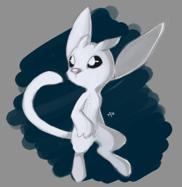Thank you guys, you gave given me a lot to consider.
I understand that this small design issue (demons or no demons) is insignificant, what I am finding challenging is standing up for my vision or opinion, without smothering or disparaging the vision or opinion of another. Essentially, the communication element.
Given that its not you alone working on the project, this project is no longer "yours" alone... and while you might have a good vision, and other might choose to work towards that vision with you, you also have to accept that they might not agree with your vision 100%.
I personally think you might find it challenging because there actually is no real higher ground you can talk from. Sure, it was your idea. But once your friend started contributing, his influence on your idea grew, and at some point he has just as much investment in the project as you do. There is no "rule", nothing really giving your opinion a higher value than his at that point, even though you might have started the project.
I think at that point you either have a valid reason to strengthen your stance (like the feature creep), or you need to compromise. The third option, part ways and look for someone else to work with, most probably is not desirable anyway.
It would be something different if there was money paid, contracts signed or job titles to protect your authority.... without all of that, its all gentlemens agreements, compromises and common sense.
It would be fair to say that 80% of the time I go with his opinion, opposing it only because of feature creep (him wanting to add too many features too early in development) or if I feel it would significantly alter the theme, narrative or experience of the game in a way that I might feel is a bridge too far.
This I can understand very well... and, given that your artist friend has worked on a game project for some time now (which he has by default because you have this discussion now), he will also.
I guess the best thing to do is to mention to him that you value his input, but you fear that feature creep will endanger your milestones (which, while not a question of life and death to meet in a hobby project, can endanger the whole project because somebody could no longer have time or loose interest) and your project.
There is always the possibility of future expansions if the project actually works out and becomes a success.
Given that he would love to work on some demons now, ask him to create some concepts on what he has in mind, as long as it doesn't takes up more than X% of his time devoted to the project (still leaving him the option to work more on it in the rest of his free time). This will allow him an artistic outlet for his ideas, and might generate some interesting concepts that could be developed further in the future.








